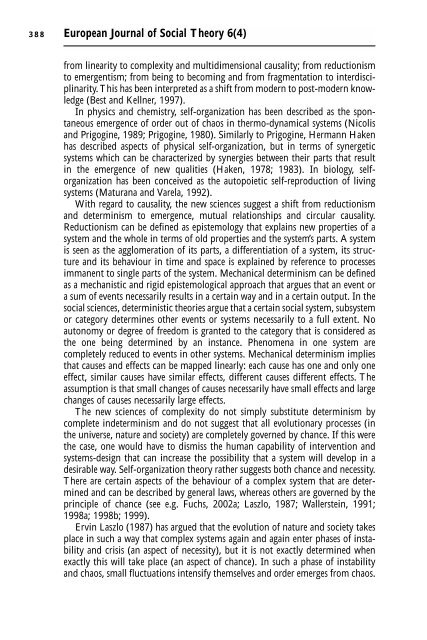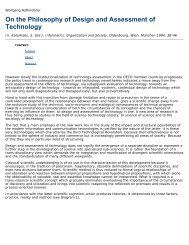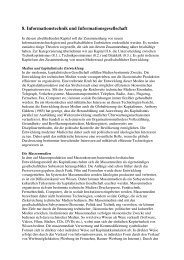Some Implications of Pierre Bourdieu's Works for a Theory of Social ...
Some Implications of Pierre Bourdieu's Works for a Theory of Social ...
Some Implications of Pierre Bourdieu's Works for a Theory of Social ...
Create successful ePaper yourself
Turn your PDF publications into a flip-book with our unique Google optimized e-Paper software.
388European Journal <strong>of</strong> <strong>Social</strong> <strong>Theory</strong> 6(4)from linearity to complexity and multidimensional causality; from reductionismto emergentism; from being to becoming and from fragmentation to interdisciplinarity.This has been interpreted as a shift from modern to post-modern knowledge(Best and Kellner, 1997).In physics and chemistry, self-organization has been described as the spontaneousemergence <strong>of</strong> order out <strong>of</strong> chaos in thermo-dynamical systems (Nicolisand Prigogine, 1989; Prigogine, 1980). Similarly to Prigogine, Hermann Hakenhas described aspects <strong>of</strong> physical self-organization, but in terms <strong>of</strong> synergeticsystems which can be characterized by synergies between their parts that resultin the emergence <strong>of</strong> new qualities (Haken, 1978; 1983). In biology, sel<strong>for</strong>ganizationhas been conceived as the autopoietic self-reproduction <strong>of</strong> livingsystems (Maturana and Varela, 1992).With regard to causality, the new sciences suggest a shift from reductionismand determinism to emergence, mutual relationships and circular causality.Reductionism can be defined as epistemology that explains new properties <strong>of</strong> asystem and the whole in terms <strong>of</strong> old properties and the system’s parts. A systemis seen as the agglomeration <strong>of</strong> its parts, a differentiation <strong>of</strong> a system, its structureand its behaviour in time and space is explained by reference to processesimmanent to single parts <strong>of</strong> the system. Mechanical determinism can be definedas a mechanistic and rigid epistemological approach that argues that an event ora sum <strong>of</strong> events necessarily results in a certain way and in a certain output. In thesocial sciences, deterministic theories argue that a certain social system, subsystemor category determines other events or systems necessarily to a full extent. Noautonomy or degree <strong>of</strong> freedom is granted to the category that is considered asthe one being determined by an instance. Phenomena in one system arecompletely reduced to events in other systems. Mechanical determinism impliesthat causes and effects can be mapped linearly: each cause has one and only oneeffect, similar causes have similar effects, different causes different effects. Theassumption is that small changes <strong>of</strong> causes necessarily have small effects and largechanges <strong>of</strong> causes necessarily large effects.The new sciences <strong>of</strong> complexity do not simply substitute determinism bycomplete indeterminism and do not suggest that all evolutionary processes (inthe universe, nature and society) are completely governed by chance. If this werethe case, one would have to dismiss the human capability <strong>of</strong> intervention andsystems-design that can increase the possibility that a system will develop in adesirable way. Self-organization theory rather suggests both chance and necessity.There are certain aspects <strong>of</strong> the behaviour <strong>of</strong> a complex system that are determinedand can be described by general laws, whereas others are governed by theprinciple <strong>of</strong> chance (see e.g. Fuchs, 2002a; Laszlo, 1987; Wallerstein, 1991;1998a; 1998b; 1999).Ervin Laszlo (1987) has argued that the evolution <strong>of</strong> nature and society takesplace in such a way that complex systems again and again enter phases <strong>of</strong> instabilityand crisis (an aspect <strong>of</strong> necessity), but it is not exactly determined whenexactly this will take place (an aspect <strong>of</strong> chance). In such a phase <strong>of</strong> instabilityand chaos, small fluctuations intensify themselves and order emerges from chaos.





